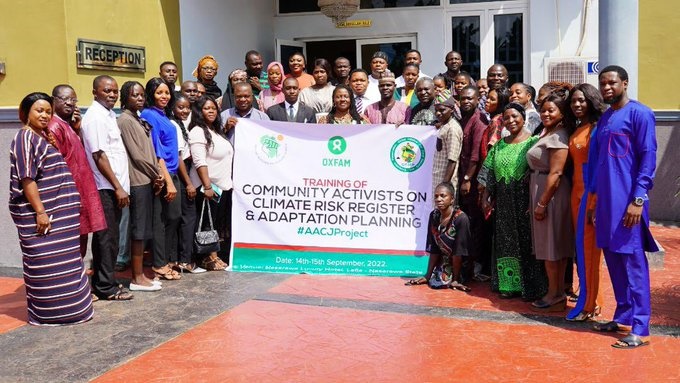The Global Initiative for Food Security and Ecosystem Preservation (GIFSEP) on Wednesday, September 14, 2022, trained 45 community activists on the development of community climate risk register.

Mr David Michael-Terungwa, Team Leader for GIFSEP, gave the figure at the two-day training in Lafia, Nasarawa State.
He said that the training became necessary to enable communities to build adaptation plan to climate change.
According to him, the essence of the training is to enable activists get back to their communities and help in developing community climate risk register and risk mitigation strategies.
According to Michael-Terungwa, climate change register highlights climate risks that have the highest likelihood and potential to have significant impact on local communities.
“The community risk register is a disaster reduction tool which helps communities to prepare for some of the climate change impacts within the communities and come up with strategies on how to cope with some of these impacts.
“The good thing about this process is that the community is at the centre of it.
“Mitigation strategies are within their ability; the ones they cannot do, development partners and government can come in to assist,’’ he said.
He said that the training was part of awareness creation on climate change impacts as well as a way of empowering communities on how to adapt to climate changes within their environments.
“We are supporting communities here, and hoping that others can take a cue,’’ he said.
Mr Joseph Ibrahim, Project Officer for GIFSEP for the African Activists for Climate Justice (AACJ) Project, said that the training was in continuation of AACJ Project being implemented by GIFSEP with support from Oxfam.
The project officer said the objective of the workshop was to train 45 community activists to identify and develop climate registers in their communities to minimise disaster occurrences.
“We hope that subsequently the community will be able to use the tool to plan better to avoid disasters arising from climate change,’’ he said.
Dr Johnson Orfega, a lecturer at the Department of Geography, Benue State University, Makurdi, who is also a participant, praised the trainers.
He said that climate change affected every sphere of life.
“There is need to understand it to adapt mitigation strategies.
“What we have learnt will be passed to communities to help them to prepare in terms of adaptive capacity to respond to climate change risks,’’ he said.
In her presentation, Dr Elizabeth Jeiyol, Executive Director, Gender and Environmental Risks Reduction Initiative (GERI), called on communities and the Benue State Government to take steps to mitigate climate change effects.
By Oboh Linus
